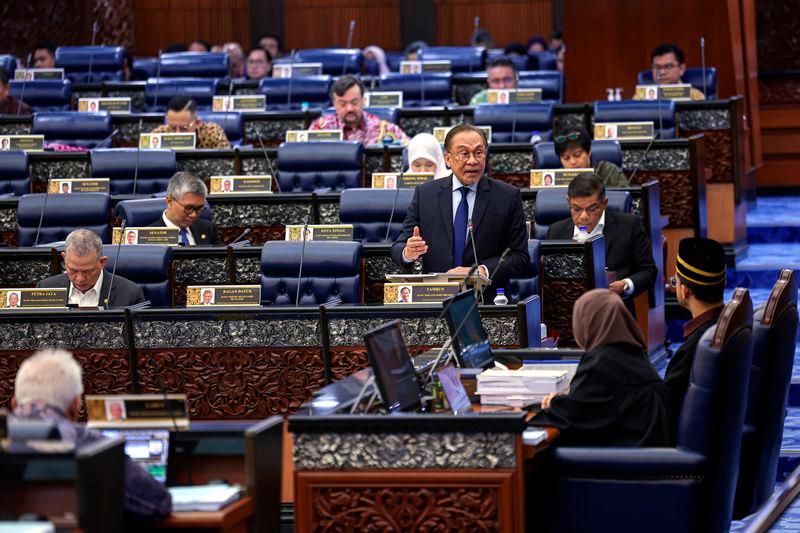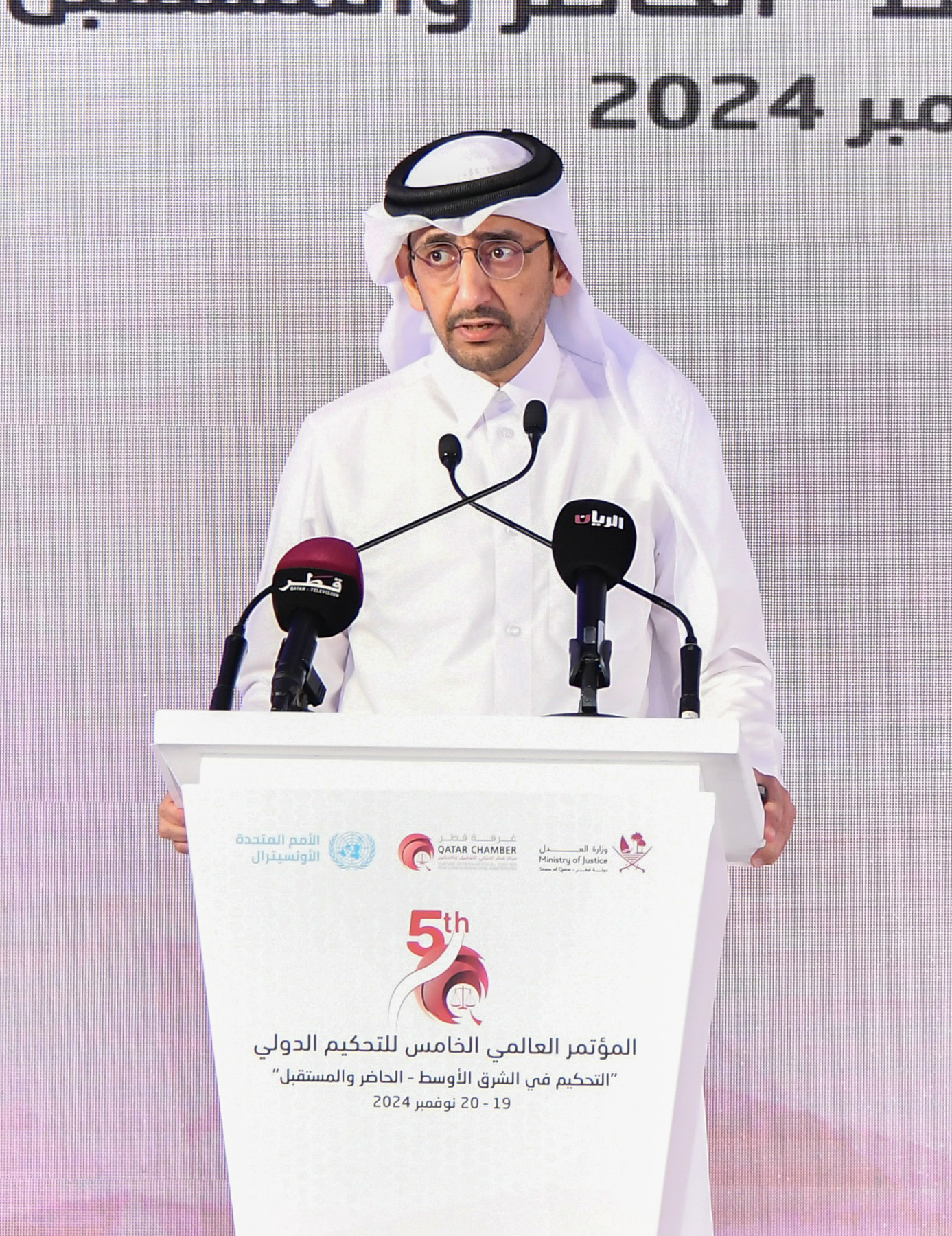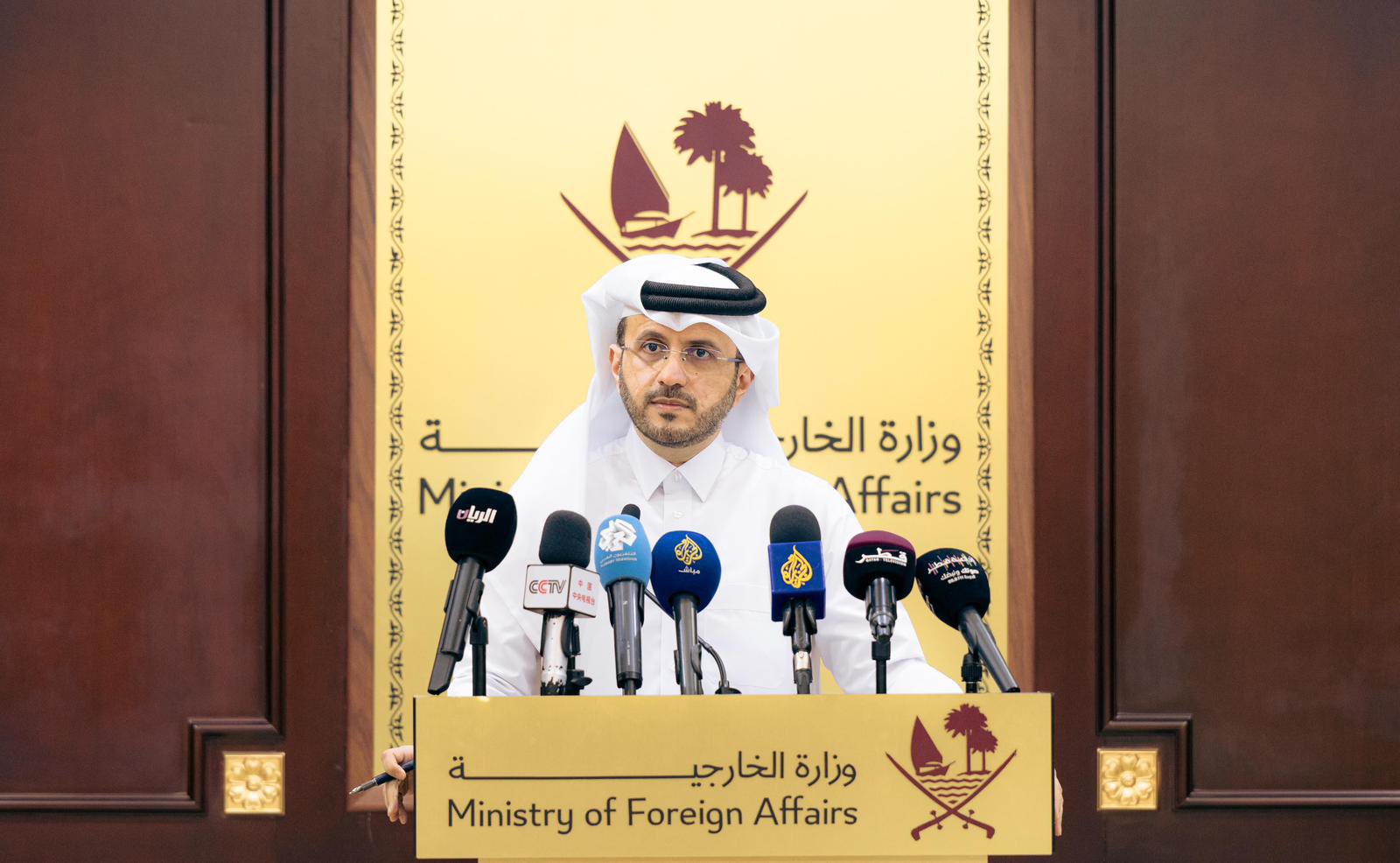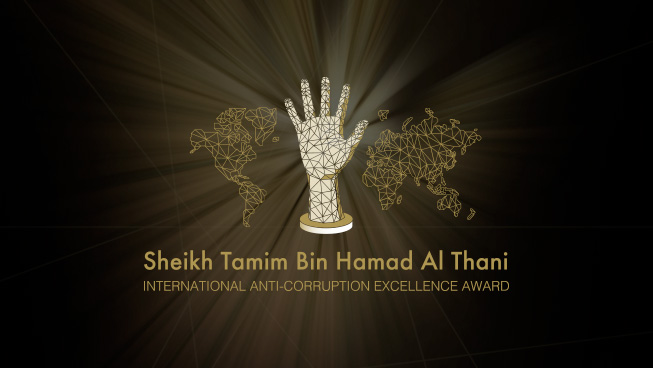With the tournament just two weeks away, scrutiny against Qatar has increased and headlines have drifted from initial reporting on migrant workers’ welfare.
Public outrage has erupted in Qatar following the release of yet another piece on life in the Gulf state that has been widely slammed as “inaccurate”, adding to a wider media campaign targeting Doha ahead of the 2022 FIFA World Cup.
Published by the Telegraph on Saturday, the opinion piece titled “I lived in Qatar and the speculations of police torture are no surprise – they bring back memories” depicted an image of Doha as a less-accepting nation.
However, a post shared by the UK outlet on Instagram appeared to offer a different headline: “‘I couldn’t hold my husband’s hand without being hissed at’: What it’s like to live in Qatar”.
British author Lorna Gibb wrote the piece based on her one-year experience in Doha as a Qatar University professor between September 2007 and June 2009, per information on her Linkedin profile.
She claims she was “hissed at” in “disapproval from passers-by” for holding her husband’s hand in the streets while living in the Gulf state, and alleged she was unable to “meet a male colleague for a coffee in a cafe”, triggering uproar online.
Khalifa Al Haroon, Founder and CEO of the I Love Qatar (ILQ) Network, hit back at the article on Twitter for its inaccuracies.
“The UK media propaganda machine is on overdrive… it’s gone from twisting facts to straight up lies… a man can’t hold his wife’s hand?? Since when?? Women and Men can’t hang out in cafes together ?? Dear expats following this, can you comment down below on this?” said Al Haroon, also a Qatari citizen.
On Instagram, Al Haroon debunked Gibb’s claims, saying he publicly holds his wife’s hand all the time while clearly identifying as a Qatari in his traditional white thobe. He also dismissed the claim that men and women are not allowed to meet up in public settings, including cafe’s and restaurants.
“Hope you don’t judge an entire country by the actions of few. That’s called racism,” he said.
While some criticised the outlet’s lack of professionalism, other residents of Qatar opted to mock the report.
“Really?? How much did this story cost? Qataris themselves meet with their opposite gender colleagues publicly in cafes and restaurants and [you] are saying an expat was hissed at,” one person said.
Meanwhile, Khalid Albakri, a Qatari diplomat said: “It’s truly ignorant and pathetic that people are stooping this low for attention. I am from Qatar and see many people holding hands without any discomfort or disapproval[…]hate has no home here”.
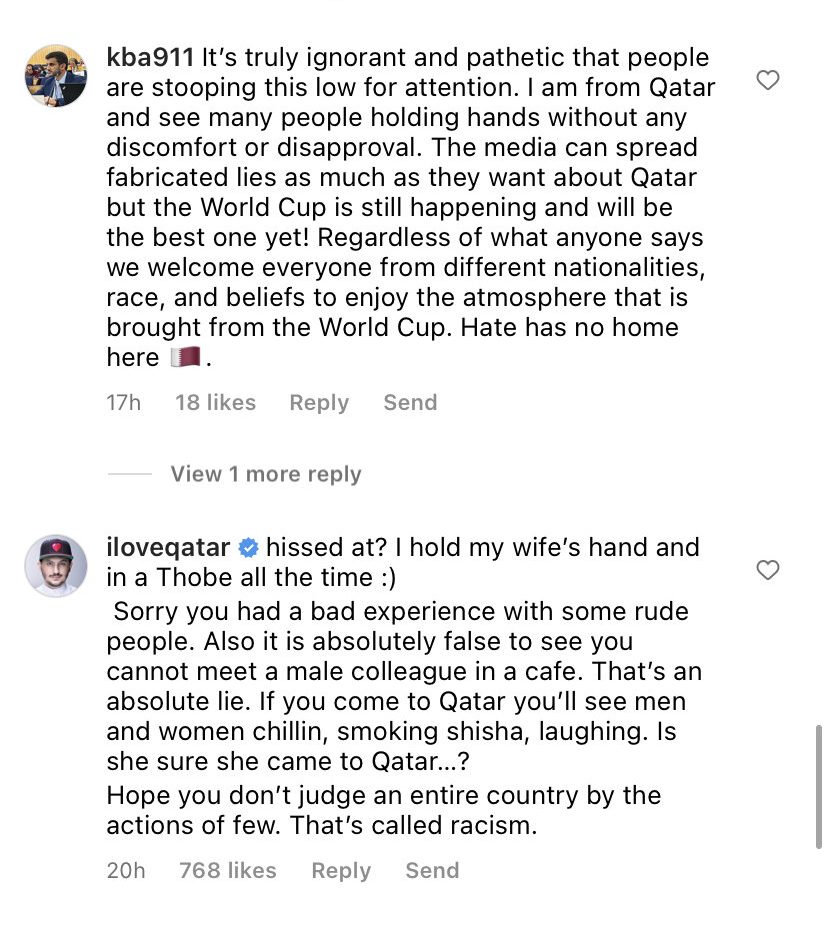
One resident questioned the apparent campaign targeting the World Cup host nation.
“I wish I knew what the true political agenda is behind this ferocious relentless attacking of Qatar in the UK media. This below is just a disgusting lie. But I am just curious as for why?”
A British social media user who has resided in Qatar for 12 years echoed the same sentiment, showing a starkly different experience than Gibb’s.
“My husband and I respect the culture and are allowed to hold hands, drink alcohol and go out together. I am ashamed of the UK media yet again for portraying lies. Come to Qatar, support your team and enjoy the football,” she said.
Meanwhile, Dr. Zarqa Parvez, Assistant Professor in Government at Georgetown University in Qatar, took aim at the “orientalist depiction of life” in the Gulf state in the article.
“UK media’s biased, orientalist depiction of life in Qatar and culture is intentional and speaks volumes of the media propaganda. I would share my experiences in UK as a student where I felt unsafe and discriminated multiple times-but I’m not in the state to share toxic memories,” tweeted Dr. Parvez.
“A muslim woman wearing hijab gets verbally almost physically attacked during daylight at London tube,” she added.
While Gibb maintains that her article was based one a single one-year experience, many questions were focused on the editorial purpose of publishing the article now.
“We invite The Telegraph staff to come and walk with us here, holding hands and to have coffee[…]Western media, you just want to get views and likes on anything anti-Qatar nowadays,” tweeted Dima Khatib, managing director at AJ+.
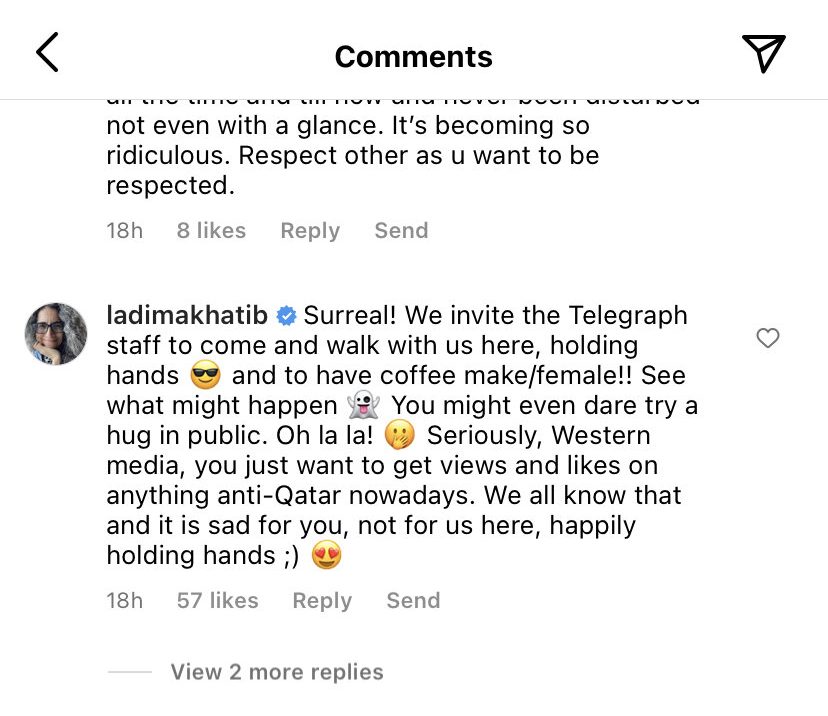
A Kuwait-based Twitter user also pointed to the latest media attacks on Qatar.
“I’ve been to Qatar several times the past couple of years and I’ve noticed that expats are giving all sort of freedom with respect to the country culture. It is pure fabrication and twisting of facts, shame on them,” he said in a Tweet.
Anti-Qatar campaign
The latest article comes amid a growing media campaign, mainly from the west, that has targeted Qatar’s hosting of the 2022 FIFA World Cup.
With the tournament just two weeks away, scrutiny has increased and headlines have drifted from the previous reporting that focused on concerns over migrant workers’ welfare.
Qatar’s Amir Sheikh Tamim bin Hamad Al Thani as well as other top Qatari officials have repeatedly slammed “racism” behind the campaigns, especially since they have continued to emerge despite Qatar addressing concerns and launching major reforms.
Last month, the amir described the campaigns as “ferocious” and questioned intentions behind the criticism.
More recently, Qatar’s Foreign Minister Sheikh Mohammed bin Abdulrahman Al Thani told France’s Le Monde that the campaigns are “hypocritical” and disregard Doha’s reform.
The Qatari diplomat said he came across recent commentary that accused Qatar of not being “intellectually and culturally ready” to host the World Cup.
“Is such racism acceptable in Europe in the 21st century? Football belongs to everyone. It is not reserved for a club of elites. Four hundred and fifty million Arabs are delighted that the World Cup is finally being held in their region,” said Sheikh Mohammed.
Qatar made history in 2010 when it became the first Arab country to win a bid to host the FIFA World Cup. However, it has endured a slew of attacks from the western world.
Last year, various European countries doubled down on scrutiny with the launch of a campaign to boycott the World Cup. These include Denmark, the Netherlands, and France. However, despite this, ticket sales have spiked in Europe.
With Qatar being the first Arab host nation of the World Cup, some of the some 1.5 million football fans are likely to be visiting the region for the very first time.
Commenting on what Le Monde described as “the clash of cultures”, Sheikh Mohammed reiterated that Qatar’s people are “very welcoming”.
“The entire world is welcome in our country. All we ask is that fans respect our laws, just as we are expected to respect yours when we visit you,” he said.
“The World Cup in Qatar is like any other sporting event in the world. Qatar has a friendly relationship with these countries, in Europe, in South America and we are working with them on security,” said Sheikh Mohammed.




